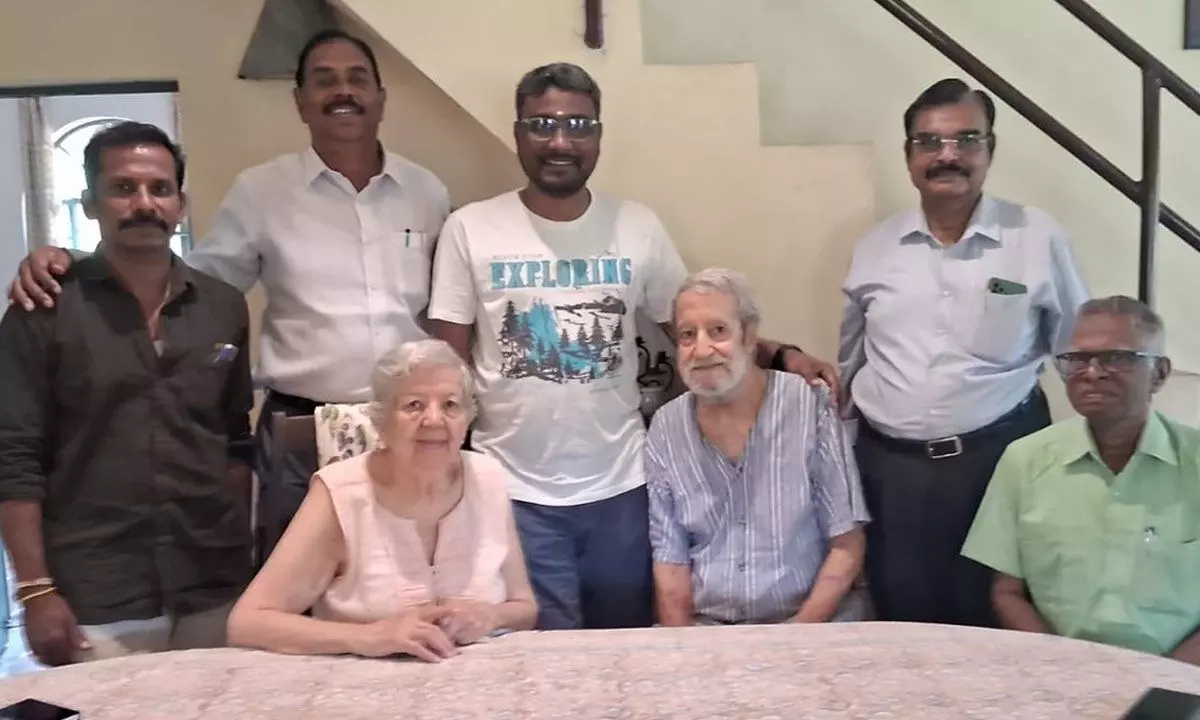Live
- Sudanese army recaptures capital of Sinnar State in central Sudan
- Kishkindha Kaandam Review: Some movies prove not to compromise in having a good cinematic experience and this is one of them
- Son-rise: Hemant Soren grows taller as tribal leader, makes father proud
- ISL 2024-25: 10-man NorthEast United FC hold on to take three points vs Punjab FC
- BGT 2024-25: Jaiswal’s application, commitment to form a partnership was so impressive, says Gilchrist
- BGT 2024-25: Personally, I am very happy with my performance, says Harshit Rana
- Pakistan's Lahore remains world's most polluted city despite light drizzle
- Asha Nautiyal retains Kedarnath for BJP, to be back as MLA after 12 years
- India leads world in science, innovation research: Minister
- Flash flood in Indonesia's South Tapanuli claims two lives
Just In
Focus on labour-intensive sector to address unemployment problem


Resource persons at a workshop
Stimulate economic growth and create jobs by focusing on labour-intensive sectors, enhancing skill development programmes, supporting MSMEs and startups, said Young India Project (YIP) CEO Narendra Bedi and Sonja Bedi.
Anantapur: Stimulate economic growth and create jobs by focusing on labour-intensive sectors, enhancing skill development programmes, supporting MSMEs and startups, said Young India Project (YIP) CEO Narendra Bedi and Sonja Bedi.
This would facilitate in addressing unemployment challenge and ensure sustainable economic development, they said. Addressing a workshop on the subject 'Stimulate economic growth to reduce unemployment' near here at the YIP campus on Tuesday, Narendra Bedi observed that the high joblessness among educated youth, particularly women, is a significant challenge in India.
According to the IHD/ILO report, women constitute a larger share of the educated unemployed youth (76.7%) compared to men (62.2%). Additionally, India's female labour force participation rate is one of the lowest in the world, at about 25%.
This situation is driven by several factors, including inadequate care economy infrastructure, rigid social norms and lack of adequate skills. Lack of care economy infrastructure and the absence of comprehensive policies and infrastructure to support the care economy - such as childcare services, elder care, and healthcare - makes it difficult for women to balance work and family responsibilities.
Traditional gender roles and societal expectations often restrict women’s participation in the workforce. Women are frequently expected to prioritise household and caregiving responsibilities over professional careers.
There is lack of adequate skills training and development programmes tailored to women’s needs which hampers their employability in both traditional and emerging sectors. To offset these challenges, the government should invest in accessible and affordable childcare and elder care services to help women balance work and family responsibilities. Implement policies that provide paid parental leave for both mothers and fathers to encourage shared caregiving responsibilities. Resource person M Suresh Babu stressed on developing and expanding vocational training and skill development programmes specifically designed for women, focusing on both traditional sectors and emerging fields like technology and digital services.
Recognise and incorporate the economic value of unpaid care work into national accounts and economic policies. Increase public and private investment in sectors related to the care economy, creating jobs and improving services that support women’s employment. Dr Ganesh Iyer CEO Entre Sphere spoke on fiscal policies aimed at stimulating demand and investment. This could include tax incentives, subsidies, or increased public spending on infrastructure projects.
Adjust monetary policies to ensure low interest rates, making borrowing cheaper for businesses and consumers to stimulate investment and spending.
Boost labour-intensive sectors by providing incentives for manufacturing and agricultural activities. This could involve subsidies, tax breaks, or direct investment in these sectors. Promote tourism and hospitality, which are significant job creators, through marketing campaigns and infrastructure development. Finally, extending financial support and easier access to credit for micro, small and medium enterprises (MSMEs) which are significant employment generators.
Prof G V Siva Reddy, president (RWA) and Prof M Sarath Babu of Citizens Forum also spoke.

© 2024 Hyderabad Media House Limited/The Hans India. All rights reserved. Powered by hocalwire.com






